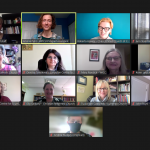Meet the Canadian WPCU Team!
Where do the WPCU resources come from?
Each year, the international WPCU resources are prepared by a team based in a different region of the world and by an international editorial team appointed by the World Council of Churches and the Pontifical Council for Promoting Christian Unity. These materials include the chosen theme, an ecumenical worship service, and a series of Scripture readings and reflections for the Eight Days of the Week of Prayer. Inviting the collaboration of ecumenical partners from around the world allows us to experience a diversity of Christian traditions and contexts. This is one of the great riches of the Week of Prayer for Christian Unity.
However, for local Canadian communities that may be unfamiliar with the context of the international host country, it can be challenging to know where to start. In 1968, the Canadian WPCU Writing and Animation Team was established in response to this need, under the care of the Faith and Witness Commission of The Canadian Council of Churches and in partnership with the Canadian Centre for Ecumenism and the Prairie Centre for Ecumenism. Although the Team’s work has shifted over the years, its goal has always been to help Canadian communities adapt and use the WPCU materials in a variety of ways.
Meet the Canadian WPCU Writing and Animation team
Composed of lay and ordained volunteers representing the member churches and partners of the Canadian Council of Churches, the Canadian Centre for Ecumenism, and the Prairie Centre for Ecumenism, the WPCU Writing and Animation Team meets in March through May of each year to make the international materials accessible to Canadian Christians and to produce supplementary Canadian resources. Together, Team members from across Canada review the next year’s theme and ecumenical service in the light of the Canadian context, compile Canadian hymn suggestions, and prepare many other resources that may assist communities in organizing local ecumenical WPCU events.
The WPCU Writing and Animation Team asks questions like: “What is the relevance of the international theme to the Canadian context? What will Canadian WPCU leaders need to keep in mind as they prepare the ecumenical service? How can we encourage leaders to be creative with the international materials?”
Most importantly, the Canadian WPCU Team seeks to enable the flourishing of ecumenical worship, Bible studies, and fellowship in Canadian communities. This means that the Team is always looking for ways to improve its work based on the lived realities and needs of the communities it serves. The Team relies on feedback from local WPCU leaders to learn about what is and is not working for their communities. If your community has celebrated the WPCU and you have stories about what works or ideas for improvement, please reach out to simakova@councilofchurches.ca—we'd love to hear from you!
The future of the WPCU Team in Canada
A lot has changed about the WPCU in Canada since the Team’s beginnings. The Team once focused its efforts on adapting the international ecumenical service for the Canadian context. Now it emphasizes producing a range of original Canadian resources to supplement the international materials. Recent years have also seen the development of the weekofprayer.ca and semainedepriere.ca websites, and the COVID-19 pandemic has cemented the shift to primarily virtual modes of sharing information about the WPCU. What will be next?
When asked about her thoughts regarding the future of the Team and the WPCU in Canada, current WPCU Team chair Rev. Roberta Howey expressed a desire to “[encourage] people to connect across churches” not only during the Week of Prayer itself, but “throughout the year.” She hopes that the WPCU might become a “hub” for learning how to foster ecumenical friendships, helping communities to see that “worship is one of the easiest ways to get people to connect.”
As the WPCU continues to grow and change in Canada, Rev. Howey says that the Team would love to hear from the communities it serves. “Tell us what doesn’t work! Tell us what does work!” she says. “We’d much rather hear about what doesn’t work, so we can fix it, than [hear only] silence, so that it takes us ten years to realize [something] is not working.”





